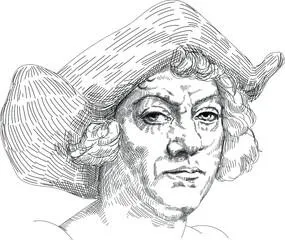Articles
Exploring History's Greatest Adventures throughout time!


How to teach kids about Christopher Columbus (and other controversial historic figures)
Every year on October 12 we celebrate Columbus Day in the Americas because that is the anniversary of the day Christopher Columbus arrived in the New World. Some countries call it something different – like Day of the Race in Mexico – to commemorate Europeans first contact with Native Americans.
In recent years, Christopher Columbus’ fame has lost its sparkle due to controversy over the horrible way he treated the natives. Should we join the cancel culture and pull the topic completely from the classroom? Or should we get to the bottom of his life and teach a more accurate story?
One thing we know for certain, history is usually written by the victors. In Columbus’ case, that may have been his rival, Francisco de Bobadilla, who was both a knight and an official of the Crown of Castile, and who would have benefited greatly by making Columbus look bad.
In a defensive letter to the Nurse of Prince John, 1500, Columbus wrote, “On the second day after his [Bobadilla’s] arrival he created himself Governor, and appointed officers and made executions, and proclaimed immunities […] and that he came to pay everybody in full up to that day, even though they had not rendered service’ and he publicly notified that, as for me, he had charge to send me in irons […] alleging a thousand disgraceful and discourteous things about me. All this took place on the second day after his arrival, as I have said, and while I was absent at a distance, without my knowing either of him or of his arrival.”
Later in the same letter he wrote of de Bobadilla, “About my papers I have a greater grievance for he has so completely deprived me of them that I have never been able to obtain a single one from him; and those that would have been most useful in my exculpation are precisely those which he has kept most concealed. Behold the just inquisitor!”
What Francisco de Bobadilla wrote of Columbus may have been tainted with hatred and ulterior motive. On the other hand, even Columbus’ own writings may have tilted in the direction he wanted Queen Isabella to see. After all, he had a lot riding on the outcome. He had struck an agreement with the Spanish monarchy that could make him a wealthy man if his voyage was successful.
For example, Ferdinand and Isabella promised a lifetime pension to the first person to sight land. Supposedly, a lookout from the Pinta spotted land early on October 8 and that was later verified by the Captain, who then alerted Columbus. But Columbus later wrote to the Queen that he was the one who spotted the land and, therefore, claimed the prize for himself.
Of the first people he encountered, Columbus wrote, “They were very well built, with very handsome bodies and very good faces. They do not carry arms or know them […] They should be good servants.” One has to ask what he meant by “servants” especially given that those peoples were soon forced into slavery to collect gold. He returned to Spain in March with gold, spices, and “Indian” captives.
But he was also doing exactly what was expected of him and was honored for it when he returned to Spain. As he later wrote in the same defensive letter to the Nurse of Prince John, “I ought to be judged as a Captain who went from Spain to the Indies to conquer a numerous and warlike people, whose customs and religion are very contrary to ours; who live in rocks and mountains, without fixed settlements, and not like ourselves; and where, by the divine will, I have placed under the dominion of the King and Queen, our sovereigns, another world, through which Spain, which was reckoned a poor country, has become the richest.”
Clearly to us today, Columbus was no innocent, but he believed he was doing the right and honorable thing by introducing the natives to the Catholic God and claiming them in the name of the Spanish king and queen. He also collected the gold that would make Spain a rich country.
Keep in mind that 1492 was a cruel time. Cruelty was not only commonplace, it was expected, especially when it came to religious differences. Ferdinand and Isabella created the Spanish Inquisition in 1478 to identify and convert heretics to Catholicism in all Spanish colonies and territories. (After Columbus’ discovery and lifetime, the Inquisition eventually came to the islands and Spanish possessions in North, Central, and South America.)
Columbus also was busy exploring other islands and mainland coasts while someone else minded the settlements. This doesn’t mean we should excuse the cruelty or that he didn’t order it. But, it also means we cannot place all the blame at Columbus’ feet.
As for diseases that Europeans brought to the natives, even the most educated physicians of the time didn’t know what caused them and could not have prevented that exchange. If the discovery had been made later by someone else, the same thing would have happened.
So what do we teach our children about Christopher Columbus? Was he a hero? Or a misguided tyrant? We can’t deny he made a big splash on our historical timeline, regardless of what happened next. It’s a key event that can’t be ignored. After all, there’s the pre-Columbian era and the post-Columbian era.
Instead, let’s teach our children that there are many sides to every story. Teach them how to research facts, but even then, to learn and understand the various angles, prejudices, cultures and motives involved in the source materials and the time period. Teach them that it’s not our job to place judgement on the topics of our research, but rather to learn what we can from the mistakes of others, and the outcomes of past events.
The bottom line is that none of us was there. None of us can possibly know all the facts. Even historians can only gather data and provide possibilities.
Let us commemorate the 1492 discovery, be it accidental or otherwise, and regardless of what followed. After all, the world would be quite different without it.
Let us also commemorate Indigenous Peoples Day to celebrate their rich culture and history in the land on which we all now live. Surely, they have earned our empathy and recognition.
Thoughts to explore with your students…
If Columbus hadn’t stumbled on the Americas by accident, would someone else have found it? What might have been the outcome?
Experts in three countries had written Columbus off before he turned to Spain. Those experts didn’t say it would be impossible. They said his calculations were wrong. If they believed the voyage would take too long, would the expense of travel and trade to India by the old-fashioned route have prevailed? Would there ever again be a reason for anyone to attempt to cross the Atlantic?
Amerigo Vespucci, another Italian and for whom America would eventually be named, was in the shipping business and may even have been present in Spain when Columbus returned from his first voyage. Would he (or someone else) have set his mind west if Columbus hadn’t already done so?
Consider also Lief Erikson, the Norse explorer who made it to Canada 500 years before Columbus’ time. After 500 years, the Norse never made a return trip. Why not?
Certainly, science would eventually have caught up if no one came before the age of satellites, flight and space exploration. How different might the outcome have been for the natives if the discovery had been made in modern times?
Recommended reading:
Christopher Columbus and the Age of Exploration for Kids portrays the “Admiral of the Ocean Seas” neither as hero nor heel but as a flawed and complex man whose significance is undeniably monumental. Kids will gain a fuller picture of the seafarer’s life, his impact, and the dangers and thrills of exploration.
Fun hands-on activities illuminate both the nautical concepts introduced and the times in which Columbus lived. Kids can:
Tie nautical knots
Conduct a blanket (silent) trade
Make a compass
Simulate a hurricane
Take nautical measurements
And much more
© 2023. Historic Books for Kids - All Rights Reserved
Reading Pennsylvania, USA


